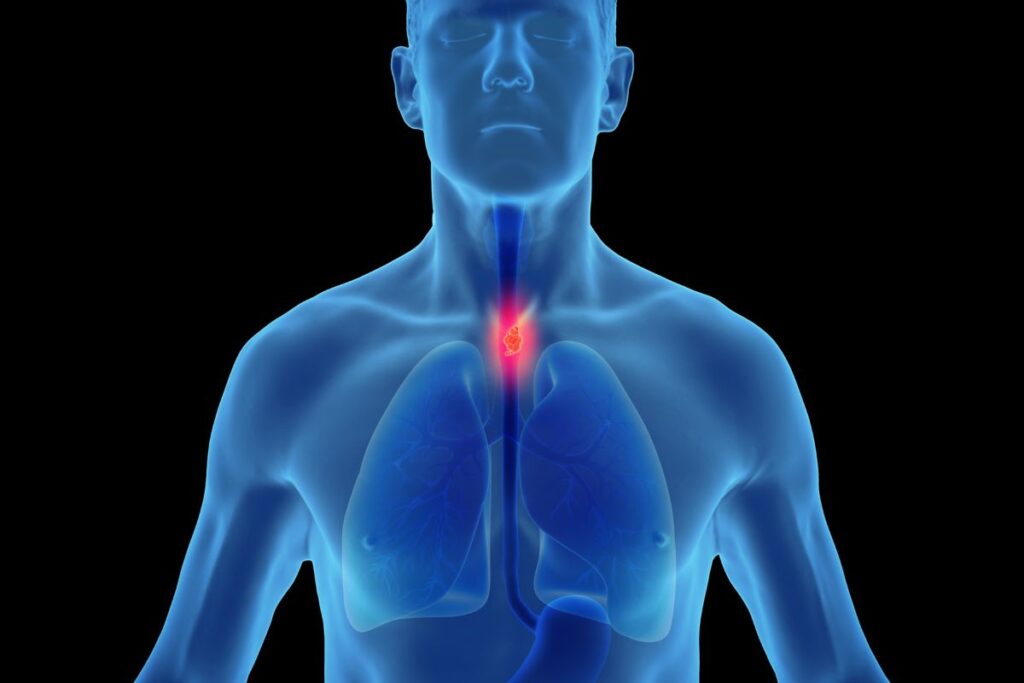A type of cancer that develops in the esophagus is known as esophageal cancer. It is a tube that carries food from the mouth to the stomach. It can be life-threatening, but early detection and treatment can improve outcomes. This article will explore the symptoms, screening guidelines, diagnostic tests, treatment options and bust common myths about esophageal cancer.
Red Flags and Symptoms of Esophageal Cancer
Esophageal cancer often develops slowly and doesn’t cause symptoms in the early stages. However, as the disease progresses, the following symptoms may appear:
1. Difficulty Swallowing (Dysphagia): One of the earliest signs is difficulty swallowing, especially solid foods. As the tumour grows, swallowing liquids may also become difficult.
2. Persistent Heartburn or Indigestion: Chronic acid reflux or heartburn, especially if it worsens over time, may be a sign of esophageal cancer.
3. Unexplained Weight Loss: There is an unexpected weight loss that is happening without dieting and is a common symptom, often due to difficulty swallowing or reduced appetite.
4. Chest Pain: Pain in the chest, especially when swallowing, can be a sign that the cancer has spread.
5. Hoarseness or Chronic Cough: Hoarseness or a persistent cough, especially if combined with other symptoms, could indicate esophageal cancer.
Screening for Esophageal Cancer: Who Should Get Tested and When?
Screening for esophageal cancer is not routinely recommended for the general population, but certain high-risk groups may benefit from regular testing:
1. Endoscopy: Individuals with a history of Barrett’s esophagus, chronic acid reflux, or smoking may benefit from regular endoscopic screening.
2. Barium Swallow: A barium swallow X-ray can help detect abnormalities in the esophagus, especially when dysphagia is present.
3. CT or MRI Scan: These imaging tests help examine the extent of the cancer and check if it has spread to other organs.
Diagnostic and Screening Tests for Esophageal Cancer
1. Endoscopy: A procedure where a thin tube that has a camera is inserted into the esophagus to look for tumors or abnormal areas. A biopsy can be taken during this procedure.
2. Barium Swallow: A special X-ray of the esophagus after drinking barium contrast liquid can reveal abnormalities, such as strictures or tumors.
3. CT or MRI Scan: These imaging tests are used to check if cancer has spread to nearby lymph nodes or other organs.
4. Biopsy: A biopsy is an accurate way to diagnose esophageal cancer. A sample of tissue is taken from a suspicious area during an endoscopy.
Treatment Options for Esophageal Cancer
Treatment is determined by the stage and location of the cancer. Common treatment options include:
1. Surgery: In early-stage cancers, surgery to remove part or all of the esophagus may be performed.
2. Radiation Therapy: To target cancer cells, radiatiotherapy is used along with chemotherapy to target cancer cells.
3. Chemotherapy: Especially in cases when the disease has progressed, chemotherapy medications are used to destroy cancer cells and reduce tumor size.
4. Targeted Therapy: Targeted drugs focus on specific molecules involved in cancer cell growth.
5. Immunotherapy: Immunotherapy can help boost the immune system’s ability to fight cancer.
Cancer Myths: Busting Common Misconceptions About Esophageal Cancer
1. Myth: Only older adults get esophageal cancer.
Fact: Younger people can develop oesophageal cancer, especially if they have risk factors, including chronic acid reflux, alcoholism, or smoking.
2. Myth: All cases of heartburn lead to oesophageal cancer.
Fact: While chronic acid reflux is a risk factor, most cases of heartburn do not lead to oesophageal cancer.
3. Myth: Esophageal cancer is always fatal.
Fact: Early detection and treatment can improve survival rates, and oesophageal cancer is treatable when caught in the early stages.
How HealthPil Can Help:
At HealthPil, we offer expert consultations with top oncologists who specialise in oesophageal cancer. Our platform can connect you with specialists for second opinions, advice on screenings, and treatment options. Timely detection and treatment can improve the outcome of esophageal cancer significantly.
FAQs: Your Esophageal Cancer Questions Answered
What are the early symptoms of esophageal cancer?
Symptoms include difficulty swallowing, heartburn, unexplained weight loss, chest pain, and persistent coughing or hoarseness.
Who is at risk for esophageal cancer?
Individuals with chronic acid reflux, smoking, alcohol use, or a history of Barrett’s esophagus are at higher risk.
How is esophageal cancer diagnosed?
Diagnosis involves endoscopy, barium swallow X-rays, CT scans, MRI scans, and biopsy.
What are the treatment options for esophageal cancer?
Treatment options include surgery, radiation therapy, chemotherapy, targeted therapy, and immunotherapy.
Can esophageal cancer be prevented?
Avoiding smoking, limiting alcohol consumption, and managing acid reflux can reduce the risk of esophageal cancer.
Disclaimer:
The information provided here is solely intended for educational purposes and should not be used in place of professional medical advice, diagnosis, or treatment. Always consult your doctor for medical advice tailored to your specific condition.

